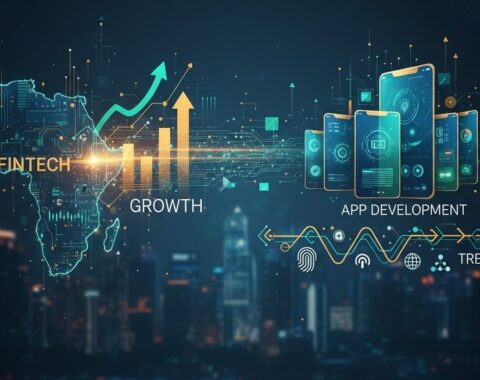With the exponential growth of mobile applications, cybersecurity has become a crucial concern for developers and businesses. Mobile apps handle sensitive personal information, financial transactions, and business-critical data, making them prime targets for cybercriminals. As users entrust apps with personal and financial data, ensuring robust security measures is vital to prevent data breaches, cyberattacks, and unauthorized access.
At Appbirds Technologies, we understand the significance of cybersecurity in mobile app development. We prioritize security throughout the development lifecycle to create secure, reliable, and trustworthy mobile applications that protect users’ data and maintain compliance with industry standards.
Why Cybersecurity Matters in Mobile App Development
1. Rising Threat of Cyber Attacks on Mobile Apps
Cybercriminals continuously evolve their tactics to exploit vulnerabilities in mobile applications. With the increasing adoption of mobile apps for banking, shopping, healthcare, and social networking, hackers target weaknesses in app security to gain unauthorized access to user data. The consequences of cyberattacks include financial loss, reputational damage, and regulatory penalties.
2. Protection of Sensitive Data
A single security flaw can expose sensitive user information, leading to severe consequences for businesses and users alike. Personal data such as names, addresses, payment details, and login credentials are highly valuable to cybercriminals. Implementing robust encryption, secure authentication, and data masking techniques can prevent unauthorized data access and mitigate the risk of breaches.
3. Compliance with Data Protection Regulations
Regulations such as GDPR (General Data Protection Regulation), HIPAA (Health Insurance Portability and Accountability Act), and PCI-DSS (Payment Card Industry Data Security Standard) mandate stringent security measures to protect user data. Failure to comply with these regulations can lead to legal penalties, reputational damage, and loss of customer trust. Ensuring compliance helps businesses avoid hefty fines and enhances credibility.
4. Maintaining Trust and Reputation
A security breach can have a devastating impact on a company’s reputation. Customers expect their data to be protected, and any compromise in security can lead to a loss of trust and business. Studies show that businesses suffer long-term customer attrition after a data breach. By prioritizing security, businesses can strengthen their brand reputation and foster customer loyalty.
5. Preventing Financial Losses
The financial impact of cyberattacks can be devastating. From legal fees and fines to remediation efforts and lost revenue, the costs associated with security breaches are significant. Companies may also face indirect costs such as increased insurance premiums and potential stock price drops. By implementing strong cybersecurity measures, businesses can prevent these losses and safeguard their financial stability.
Common Cybersecurity Threats in Mobile Apps
Understanding the various threats that mobile apps face is crucial for developing effective security strategies. Some common cybersecurity threats include:
- Data Breaches: Unauthorized access to sensitive data due to weak passwords, poor encryption, or vulnerabilities in the app’s code.
- Malware and Ransomware: Malicious software designed to steal data, disrupt operations, or demand ransom for encrypted files.
- Phishing Attacks: Cybercriminals use deceptive techniques, such as fake login screens or emails, to trick users into revealing sensitive information.
- SQL Injection and Cross-Site Scripting (XSS): Attacks that exploit vulnerabilities in an app’s database or web interface to inject malicious code.
- Man-in-the-Middle (MitM) Attacks: Interception of communication between the app and the server, allowing hackers to eavesdrop or alter data transmissions.
Strategies for Enhancing Cybersecurity in Mobile Apps
To effectively protect user data, mobile app developers should implement the following strategies:
1. Robust Authentication Mechanisms
Implementing methods such as biometric authentication (facial recognition, fingerprint scanning), multi-factor authentication (MFA), and token-based authentication can help prevent unauthorized access. These measures add an extra layer of security to ensure that only authorized users can access the app.
2. Data Encryption
Encrypting data in transit (using HTTPS) and at rest (using AES encryption) ensures that even if data is intercepted, it remains unreadable without the proper decryption keys. Encryption is particularly crucial for apps handling sensitive financial data and personally identifiable information (PII).
3. Regular Security Audits and Penetration Testing
Conducting regular security assessments helps identify vulnerabilities before cybercriminals can exploit them. Penetration testing involves simulating cyberattacks to uncover weaknesses in the app, allowing developers to patch them before they become security risks.
4. Secure Source Code Development
Ensuring that the app’s source code is secure is vital for protecting against cyber threats. Developers should use code scanning tools, such as static application security testing (SAST), to identify vulnerabilities in the codebase and implement best practices for secure coding.
5. AI and Machine Learning for Threat Detection
Leveraging AI and machine learning (ML) can enhance threat detection capabilities, enabling proactive security measures. These technologies can analyze patterns and anomalies in real-time, identifying potential threats before they cause harm.
6. Secure Data Storage
Implementing secure data storage practices, such as using encrypted databases and ensuring that data is not stored unnecessarily, is essential. Adhering to the principle of data minimization ensures that only necessary data is collected and stored, reducing the risk of exposure.
7. User Education
Educating users about best security practices, such as using strong passwords and being cautious with links and downloads, can enhance app security. This can be achieved through in-app notifications, tutorials, and external resources.
Future Trends in Mobile App Cybersecurity
As technology evolves, so do cybersecurity threats. These are some of the latest trends in mobile app security:
- Advanced Authentication Mechanisms: New authentication methods, such as behavioral biometrics, are being developed to enhance security without compromising user experience.
- Blockchain for Data Integrity: Blockchain technology provides decentralized and secure data management solutions, ensuring tamper-proof and transparent data storage.
- Zero Trust Architecture: This approach assumes that no user or device is trustworthy by default, adding an extra layer of security by continuously verifying identity and permissions.
- Privacy-Preserving Technologies: Techniques like differential privacy and federated learning allow data analysis without compromising user privacy.
- Post-Quantum Cryptography: With the rise of quantum computing, traditional encryption methods may become vulnerable. Developers need to adopt post-quantum cryptography to safeguard data against future threats.
Best Practices for Developers
Developers can follow these best practices to ensure their apps are secure:
- Use Secure Communication Protocols: Always use HTTPS for data transmission to encrypt data in transit.
- Implement Secure Data Storage: Use encrypted databases and avoid storing sensitive data locally on devices.
- Regularly Update Dependencies: Keep all libraries and frameworks up-to-date to ensure the latest security patches.
- Conduct Regular Security Audits: Perform periodic security audits and penetration testing to identify vulnerabilities.
- Educate Users: Provide users with guidelines on how to use the app securely and avoid common security pitfalls.
Conclusion
Cybersecurity is no longer an optional aspect of mobile app development—it is a necessity. By prioritizing security, developers can protect user data, maintain trust, and ensure compliance with regulatory standards.
At Appbirds Technologies, we integrate robust security measures into every stage of the app development process, ensuring that our clients’ applications are secure, reliable, and trusted by users. Whether you’re looking to develop a new app or enhance the security of an existing one, Appbirds Technologies is your trusted partner in mobile app cybersecurity.
If you have any questions or would like to discuss how to enhance the cybersecurity of your mobile app, feel free to contact our team. We are always ready to provide expert advice and support.
FAQS
Why is cybersecurity important for mobile apps?
Cybersecurity is crucial for mobile apps because it protects sensitive user data, prevents unauthorized access, and ensures that the application remains safe from cyber threats. With increasing cyberattacks, security measures help maintain user trust and prevent financial or personal data leaks.
What are the best practices for securing mobile applications?
Some of the best practices for mobile app security include implementing strong authentication methods, using encryption to protect data, securing APIs, regularly updating the app to fix vulnerabilities, and conducting security audits. These measures help prevent unauthorized access and data breaches.
How does Appbirds ensure mobile app security?
At Appbirds, we integrate the latest cybersecurity techniques into mobile app development. This includes secure coding practices, multi-factor authentication (MFA), end-to-end encryption, penetration testing, and real-time threat monitoring. We focus on building secure apps that protect user data and comply with industry standards.
What are common security threats in mobile apps?
Some common mobile app security threats include malware attacks, phishing attempts, unsecured data storage, SQL injection, and man-in-the-middle (MITM) attacks. These threats can compromise user data, disrupt app functionality, and harm brand reputation if not addressed properly.
How does encryption improve mobile app security?
Encryption plays a key role in securing mobile apps by converting sensitive data into unreadable formats. Even if hackers intercept the data, they cannot access or use it without the correct decryption key. End-to-end encryption ensures that data remains protected during transmission and storage.
Why is two-factor authentication (2FA) important for mobile apps?
Two-factor authentication (2FA) adds an additional layer of security by requiring users to verify their identity through a second factor, such as a one-time password (OTP) or biometric authentication. This makes it significantly harder for attackers to gain access to user accounts, even if passwords are compromised.
How often should a mobile app be updated for security?
Mobile apps should be updated regularly to patch security vulnerabilities, enhance performance, and add new security features. Developers should conduct routine security audits and release updates whenever new threats emerge to keep the app protected from cyberattacks.
What role does AI play in mobile app security?
Artificial intelligence (AI) enhances mobile app security by detecting and responding to threats in real-time. AI-powered security systems can analyze patterns, detect unusual activities, and prevent potential cyberattacks before they happen, making mobile apps more secure and resilient.
How can users protect their mobile app data?
Users can improve their mobile app security by setting strong passwords, enabling two-factor authentication, avoiding public Wi-Fi for sensitive transactions, and only downloading apps from official stores like Google Play or the Apple App Store. Regularly updating apps and devices also helps maintain security.



